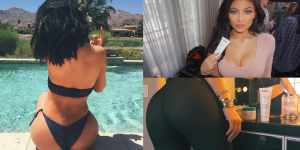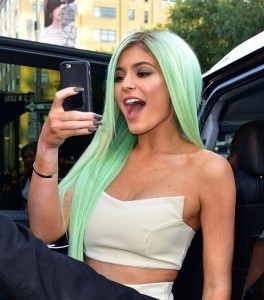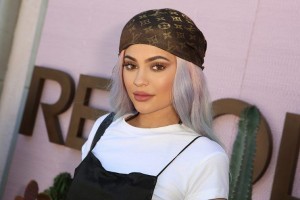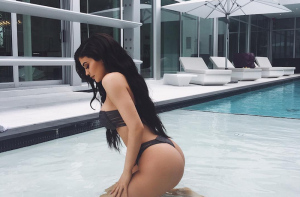At 19 years old, Kylie Jenner is the youngest person to be featured on the Forbes Celebrity 100 list, the magazine’s annual ranking of the world’s highest-paid entertainers.
The top three spots belong to Sean “Diddy” Combs ($130 million), Beyoncé ($105 million), and J.K. Rowling ($95 million.)
Twitter users were both congratulatory and condemning when it came to Jenner’s inaugural appearance on the list.
She ranked No. 59 with $41 million earned pretax in the last 12 months, only 12 spots behind half-sister Kim Kardashian, who earned $45.5 million, by Forbes’s estimation. Obviously Jenner’s fortune, which is generated primarily from reality TV shows and her budding cosmetics and lifestyles brand, according to Forbes, attracts equal parts adulation and derision.
In tandem with the rise of her own manufactured celebrity (and promptly plumped pout), Jenner launched eponymous beauty products, including Kylie Lip Kits (boxes of lip stains, liners, and glosses) following teaser announcements Jenner would make on her social media profiles, primarily Snapchat. Demand for the makeup — and subsequent Kylie-branded clothing and phone cases and apps — skyrocketed, and soon the youngest Jenner-Kardashian exploded beyond any logical limit.
A common criticism is that Jenner’s business success wouldn’t have come if not for the platform her family created for her on the E! reality television series, Keeping Up With the Kardashians, the world’s first introduction to Kylie Jenner on an accessible scale. It’s made Jenner’s privilege a lightning rod for criticism, notes Moya Luckett, a media historian and part-time faculty member at New York University.
Jenner’s success can be understood in part if one applies something called the “Matthew Effect,” a concept that means the rich get richer, the famous ever more so. Scientists, for instance, who aren’t necessarily at the forefront of research but are already famous, may attract greater recognition for their work than their lesser-known peers. The same goes for Jenner; it’s not that her lip kits are exceptional — they’re manufactured in the same facility as other brands’ products — but she’s already a well-known name hawking a trendy product, which is a recipe for success.
“It’s quite clear she’s not sitting there as a chemist, mixing up different colors of lip kit formulas and products,” Luckett tells Yahoo Style, referring to how Jenner portrays a hands-on approach to her businesses, which are mostly licensing deals that capitalize on the social media star’s popularity. “For a lot of people, that’s just a fantasy way of living and it’s completely inaccessible.”
The idea that a celebrity cashes in on his or her name, and not a particular talent for say, designing clothes, is not a novel one. There is, of course, Ivanka Trump, whose line of clothing she doesn’t actually design and whose spas she has no hand in running. And Gwyneth Paltrow, who presumably isn’t in some laboratory studying the effects of Jade Eggs on a woman’s pelvic floor muscles (she admitted as much to Jimmy Kimmel).
Nevertheless, Kylie Jenner is particularly polarizing, and it has to do with the tension she creates between how she portrays her inauthentic-authentic self on social media, according to Luckett. That is, she makes herself more accessible than an Ivanka or a Gwyneth through Snapchat and Instagram, while posing in lingerie and admitting that her money-making lips aren’t real.
“Her fashion was quirkier than the others [Kardashians], and she wasn’t fitting in with conventional models of beauty, at least before her elaborate plastic surgery,” Luckett says. “In some ways, it’s interesting to see how she’s built inauthenticity into her story, and that became the perfect platform to sell these products.”
What Jenner does share with Ivanka and Gwyneth, though, is the privilege reserved for rich, famous white women. Jenner’s social and economic status is particularly problematic, say her detractors, because she is a serial cultural appropriator, stealing and profiting from black culture without the authority to do so. It happened when she wore a do-rag to Fashion Week. And when she wore her hair in cornrows. And when she started selling camouflage bathing suits.
Jenner isn’t the only one in her family to be accused of exploiting black culture. Most recently, half-sister Khloé Kardashian was accused of using a black designer‘s ideas on her new denim line, Good American, without attribution. Still, Kylie seems to be more heavily criticized than her sisters, Luckett says.
“With Kylie, it’s more interesting since Kim and Khloé play off their half-Armenian background, which doesn’t make them black or even nonwhite, but Kylie doesn’t even have that. She’s the child of Bruce and Kris Jenner, who was of Dutch or French or Irish or Scottish background, very very white … yet somehow, I think she gets away with it. Not because she’s convincing, but because that inauthenticity doesn’t resonate with her fan base.”
But to guess we’ve finally reached peak Kardashian-Jenner would be mistaken. Despite the ennui critics grumble over, the family is of continuing interest to academics and cultural commentators. For example, Luckett’s writing a book about celebrity culture and femininity, in which Jenner will be a focus. And released in March was a book titled The Kim Kardashian Principle: Why Shameless Sells (and How to Do It Right), which landed on the New York Times bestseller list.
Oh, and Kylie Jenner’s Instagram following surpasses 95 million. Not quite a dollar per follower, but you get the idea.
Ask me anything
Explore related questions








